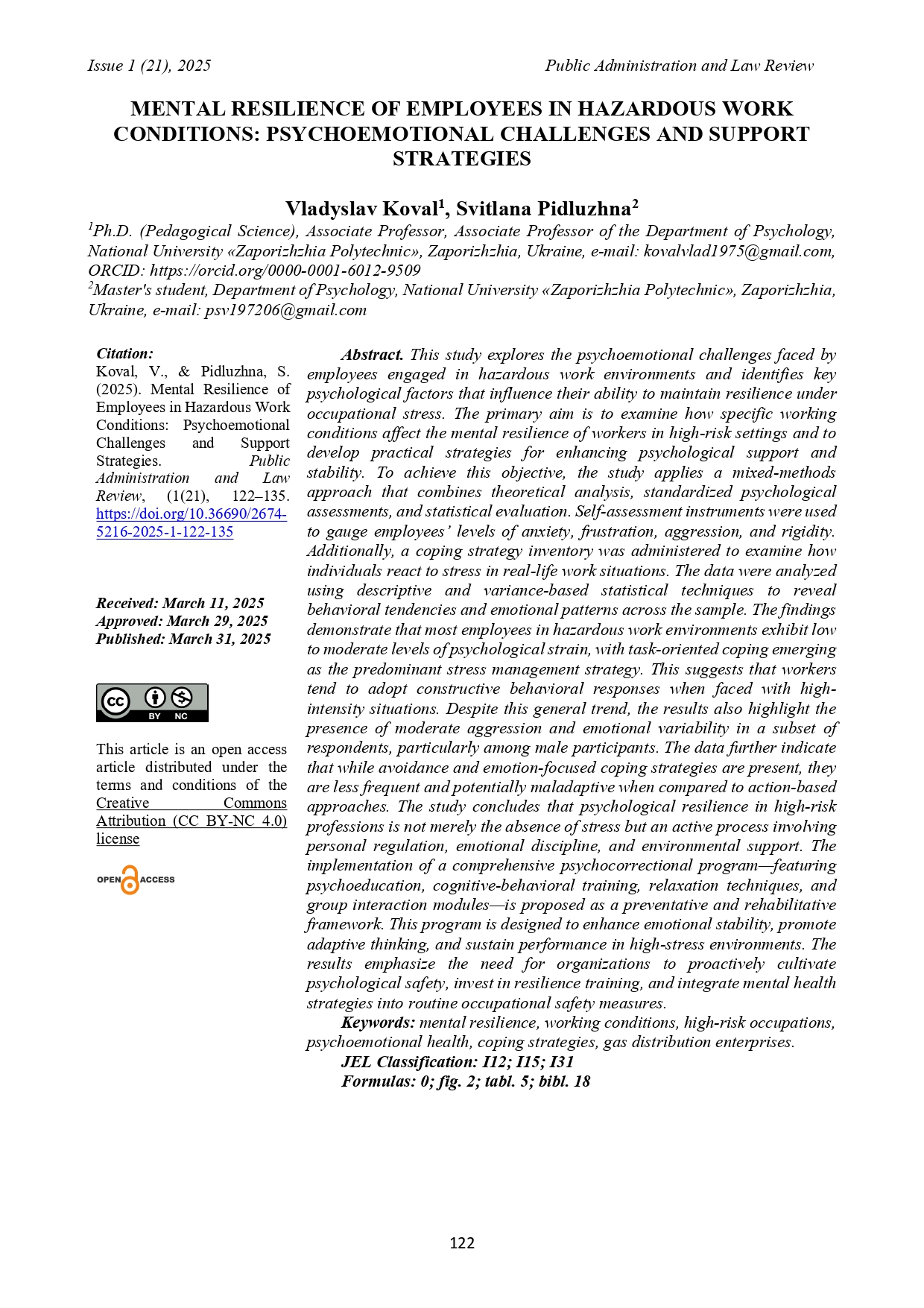MENTAL RESILIENCE OF EMPLOYEES IN HAZARDOUS WORK CONDITIONS: PSYCHOEMOTIONAL CHALLENGES AND SUPPORT STRATEGIES
DOI:
https://doi.org/10.36690/2674-5216-2025-1-122-135Keywords:
mental resilience, working conditions, high-risk occupations, psychoemotional health, coping strategies, gas distribution enterprisesAbstract
This study explores the psychoemotional challenges faced by employees engaged in hazardous work environments and identifies key psychological factors that influence their ability to maintain resilience under occupational stress. The primary aim is to examine how specific working conditions affect the mental resilience of workers in high-risk settings and to develop practical strategies for enhancing psychological support and stability. To achieve this objective, the study applies a mixed-methods approach that combines theoretical analysis, standardized psychological assessments, and statistical evaluation. Self-assessment instruments were used to gauge employees’ levels of anxiety, frustration, aggression, and rigidity. Additionally, a coping strategy inventory was administered to examine how individuals react to stress in real-life work situations. The data were analyzed using descriptive and variance-based statistical techniques to reveal behavioral tendencies and emotional patterns across the sample. The findings demonstrate that most employees in hazardous work environments exhibit low to moderate levels of psychological strain, with task-oriented coping emerging as the predominant stress management strategy. This suggests that workers tend to adopt constructive behavioral responses when faced with high-intensity situations. Despite this general trend, the results also highlight the presence of moderate aggression and emotional variability in a subset of respondents, particularly among male participants. The data further indicate that while avoidance and emotion-focused coping strategies are present, they are less frequent and potentially maladaptive when compared to action-based approaches. The study concludes that psychological resilience in high-risk professions is not merely the absence of stress but an active process involving personal regulation, emotional discipline, and environmental support. The implementation of a comprehensive psychocorrectional program—featuring psychoeducation, cognitive-behavioral training, relaxation techniques, and group interaction modules—is proposed as a preventative and rehabilitative framework. This program is designed to enhance emotional stability, promote adaptive thinking, and sustain performance in high-stress environments. The results emphasize the need for organizations to proactively cultivate psychological safety, invest in resilience training, and integrate mental health strategies into routine occupational safety measures.
Downloads
References
Arshinova, V. H., & Shuvalova, S. I. (2019). Psykholohichna stiikist osobystosti [Psychological resilience of personality]. Institute of Psychology.
Akhverdova, O. I. (2020). Stresostiikist u profesiiakh z pidvyshchenym ryzykom [Stress resistance in high-risk professions]. V. N. Karazin Kharkiv National University.
Burlakova, I. (2024). The impact of emotional intelligence and digital empathy on the financial stability of enterprises. International Conference on Economics, Accounting and Finance, Estonia, 75–76. https://conf.scnchub.com/index.php/ICEAF/ICEAF-2024/paper/view/803
Burlakova, I., Sheviakov, O., & Kondes, T. (2021). Coaching as a tool for the formation of corporate well-being. https://conf.scnchub.com/index.php/ICEAF/ICEAF-2021/paper/view/306
Burlakova, I., Sheviakov, O., & Kondes, T. (2022). Cognitive flexibility of thinking as a necessary condition for human adaptation to complex life situations. Relationship between Public Administration and Business Entities Management. https://conf.scnchub.com/index.php/RPABM/RPABM-2022/paper/view/481
Endler, N., & Parker, J. (1999). Coping Inventory for Stressful Situations (CISS): Manual. Multi-Health Systems.
Grigoryan, O. (2022). Osoblyvosti psykholohichnoi adaptatsii v ekstremalnykh umovakh [Psychological adaptation in extreme conditions]. Zhurnal psykholohii pratsi.
Karamushka, L. M. (2015). Psykholohichna bezpeka pratsi ta zdorovia personalu [Psychological safety of work and employee health]. Institute of Personnel Policy.
Kravytsov, D. (2021). Psykholohichna stiikist yak chynnyk profesiinoi sameefektyvnosti [Psychological resilience as a factor of professional self-efficacy]. Visnyk psykholohii, (2).
Luneva, T. V., & Kudryavtseva, O. Yu. (2018). Balans mizh robotoyu ta osobystym zhyttiam: vyklyky suchasnosti [Work-life balance: Modern challenges]. Naukovyi zhurnal Psykholohiia i pedahohika, 2(2), 45–52.
Maksymova, N. Yu. (2016). Sutnist i struktura psykholohichnoi stiikosti osobystosti [The essence and structure of psychological resilience]. Psykholohiia i suspilstvo, (2).
Sheviakov, O., Burlakova, I., & Kornienko, V. (2022). Psychological provision of processes modernization of metallurgical production management. Science Notes of KROK University, 2(66), 192–203. https://doi.org/10.31732/2663-2209-2022-66-192-203
Sarkisian, H. V. (2017). Vplyv stresu na psykhichne zdorovia: rol sotsialnoi pidtrymky [The impact of stress on mental health: The role of social support]. Aktualni problemy psykholohii, (1), 17–26.
Smirnov, B. A., & Dolhopolova, Ye. V. (2020). Psykho-fiziolohichna stiikist u profesiiakh z ekstremalnymy umovamy pratsi [Psycho-physiological resilience in extreme professions]. Psykhofiziolohiia, (1).
Vasylenko, Ye. (2021). Profesiino-psykholohichna stiikist pratsivnykiv [Professional-psychological resilience of employees]. Orhanizatsiina psykholohiia, (4).
World Health Organization. (2022). Guidelines on mental health at work. Geneva: WHO.
World Health Organization. (2023). Keriuni pryntsypy z okhorony psykhichnoho zdorovia na robochomu mistsi[Guidelines on mental health at the workplace]. International Labour Organization. https://iris.who.int/bitstream/handle/10665/369584/WHO-EURO-2023-5166-44929-68953-ukr.pdf
Zlobin, K., Litvin, N., & Burlakova, I. (2023). The impact of wellbeing programs on productivity and staff loyalty. Science Notes of KROK University, 1(69), 162–170. https://doi.org/10.31732/2663-2209-2022-69-162-170

Downloads
Published
How to Cite
Issue
Section
License

This work is licensed under a Creative Commons Attribution-NoDerivatives 4.0 International License.





